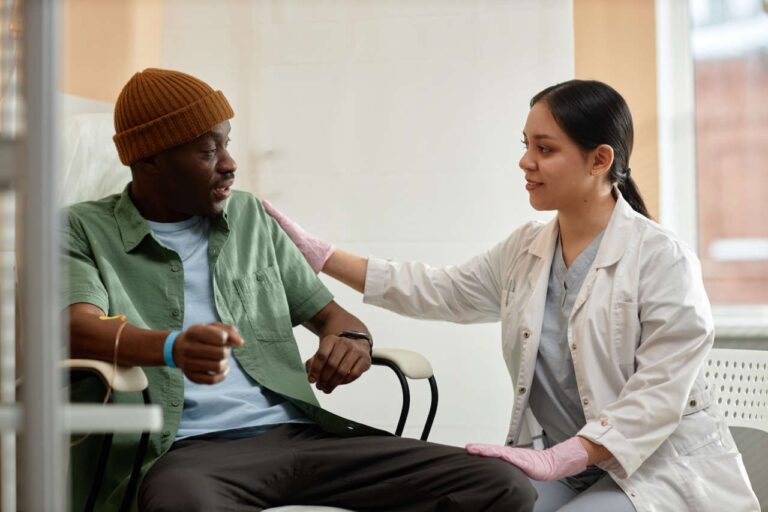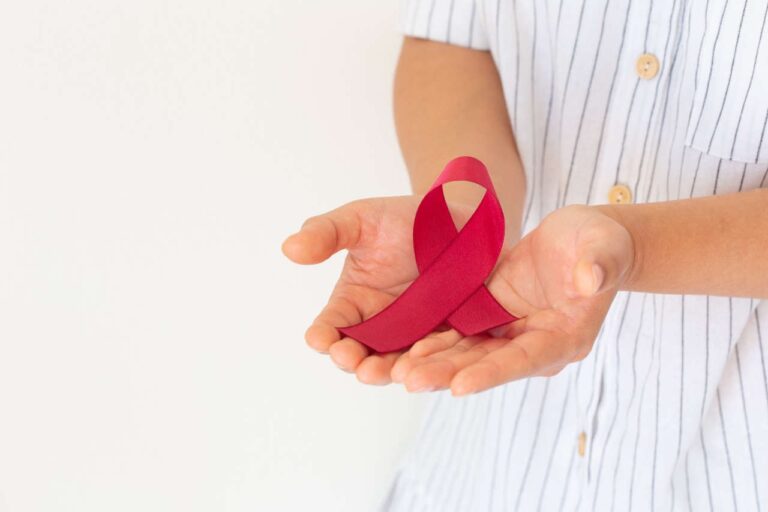
Sarclisa is a prescription medicine used with other medications to treat a type of bone marrow cancer (multiple myeloma) in adults.
Speak to a Specialist
About Copay AssistanceSarclisa is a brand-name medication. It contains the active drug isatuximab-irfc, a member of a family of medicines called monoclonal antibodies (mAbs). Monoclonal antibodies are lab-created proteins that modify your immune response to specific diseases, including cancer.
What Is Sarclisa Used To Treat?
Isatuximab-irfc injection is used with pomalidomide (Pomalyst) and dexamethasone to treat multiple myeloma in adults previously treated with at least two other medicines, including lenalidomide and a proteasome inhibitor (e.g., bortezomib).
A doctor may prescribe this medication with carfilzomib and dexamethasone to treat recurring or treatment-resistant multiple myeloma in adults who did not benefit from one to three prior therapies.
How Does Sarclisa Work?
Isatuximab-irfc kills cancer cells directly (by inducing programmed cell death) or by activating your immune cells to destroy cancer cells.
How Is Sarclisa Supplied and Used?
Sarclisa injection is available as a sterile, colorless to slightly yellow liquid in a single-dose vial. Each vial contains 100 mg/5 ml or 500 mg/25 ml of the active drug.
A doctor or nurse will administer Sarclisa by intravenous (IV) infusion into your vein. Treatment comprises two or more cycles of 28 days (4 weeks).
In the first cycle, you will receive the drug weekly (on days 1, 8, 15, and 22). In the subsequent cycles, Sarclisa is administered every two weeks (on days 1 and 15).
A doctor or nurse will monitor you closely during and after the infusion to see if you develop infusion reactions. To reduce the risk of infusion reactions, your doctor will give you specific medicines about one hour before each dose of Sarclisa, including:
- Allergy medications
- Medicine to reduce pain and fever
- A steroid
Before starting treatment, inform your doctor if you:
- Have heart problems
- Are pregnant or plan to become pregnant
- Are nursing a child
- Have had shingles (herpes zoster)
Sarclisa Dosage
With pomalidomide and dexamethasone
- Cycle 1: 10 mg/kg (actual body weight) IV weekly (on days 1, 8, 15, 22).
- Cycle 2 and beyond: 10 mg/kg IV every 2 weeks (on days 1 and 15).
With carfilzomib and dexamethasone
- Cycle 1: 10 mg/kg (actual body weight) IV weekly (on days 1, 8, 15, 22).
- Cycle 2 and beyond: 10 mg/kg IV every 2 weeks (on days 1 and 15).
Your doctor may delay your dose if you have low levels of hemoglobin, white blood cells, and platelets (cells that stop bleeding).
Duration of treatment
Treatment cycles may be repeated as long as the drug continues to benefit and does not cause severe toxicity.
Get Sarclisa Copay Assistance
Speak to a SpecialistSarclisa Side Effects
Side effects can be mild or severe.
Mild side effects
- Diarrhea
- Nausea
- Vomiting
Talk to your doctor or pharmacist if any of these side effects worsen or persist.
Common Side Effects
Upper respiratory tract infection
- Pneumonia (lung infection)
- Anemia (decreased red blood cell count)
- Thrombocytopenia (decreased platelet count)
- Diarrhea
- Trouble sleeping
- Difficulty breathing
- Cough
- Back pain
Talk to your doctor or pharmacist if any of these side effects worsen or persist.
Serious side effects
Infusion reactions
Infusion reactions can happen when your immune system over responds to the injected medicine. Sarclisa infusion reactions are common and can be life-threatening.
Seek emergency medical care if you have any of the following symptoms during and after Sarclisa infusion:
- Shortness of breath
- Wheezing
- Difficulty breathing
- Swelling of the face, mouth, throat, or tongue
- Throat tightness
- Pounding heart
- Dizziness
- Lightheadedness
- Fainting
- Headache
- Cough
- Rash or itching
- Runny or stuffy nose
- Nausea
- Chills
Decreased white blood cell (WBC) count
Sarclisa can cause a low WBC count. In some users, certain WBCs can be severely decreased. WBCs help your body fight infection. Thus, low WBC counts can make you more likely to get certain infections, such as upper and lower respiratory tract infections and urinary tract infections.
Talk to your doctor immediately if you develop fever or other signs of infection during treatment, such as:
- Chills and sweats
- Change in cough or a new cough
- Sore throat or new mouth sore
- Shortness of breath
- Nasal congestion
- Stiff neck
- Burning or pain during urination
- Unusual vaginal discharge
- Increased urination
- Redness, soreness, or swelling in any area
- Diarrhea
- Vomiting
- Abdominal pain
To reduce the risk of infection, stay away from people who are sick or have infections. Moreover, wash your hands often.
Get Copay Assistance
Financial AssistanceRisk of new cancers
Sarclisa may increase the risk of getting new cancers, such as breast and skin cancers. Call your doctor immediately if you notice:
- Changes in mole size or color
- Skin sores that do not heal
- Bloody or black stools
- Clear or bloody discharge from your nipple
- Inverted nipple
- Dimpling of the breast
- Lump in the breast or under the arm
- Red or swollen breast
- Unusual bleeding or bruising
- Unexplained weakness
Heart failure
Heart failure (inability of your heart to pump enough blood) has occurred in some users taking Sarclisa with carfilzomib and dexamethasone. Talk to your doctor immediately if you have:
- Shortness of breath
- Cough
- Swollen ankles, feet, and legs
Allergic reactions
Seek emergency medical help if you experience the following:
- Chest pain
- Hives
- Shortness of breath
- High or low blood pressure
- Fever
- Chills
Interference with medical test results
Sarclisa can affect the results of blood type tests. Thus, your doctor will do blood typing and other screening tests before the first infusion.
Inform all of your providers that you are taking Sarclisa before receiving blood from a donor.
Use in Pregnancy and Lactation
No human or animal reproduction studies are currently available. Sarclisa can harm your unborn baby. Thus, use an effective contraceptive during treatment and for 5 months after the last infusion.
Avoid breastfeeding during treatment with Sarclisa.
How Much Does Sarclisa Cost?
Cost can vary depending on your insurance plan, location, and pharmacy. Contact your insurance provider to find out if your plan covers this medication or if you need prior authorization.
Sanofi, which makes Sarclisa, offers CareASSIST to help you access Sarclisa treatment. Contact us to learn more about financial assistance for Sarclisa.














